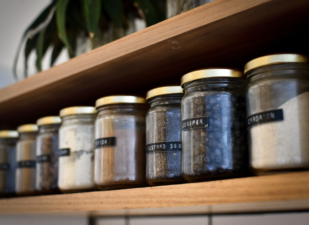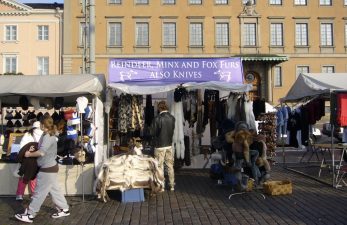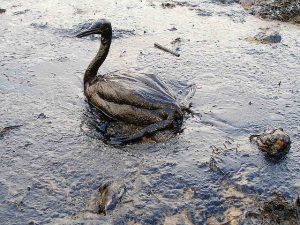 Wael looks into the horizon (on Mount Nebo, Jordan) and sees a new “green” economy that could radically improve life for Palestinians.
Wael looks into the horizon (on Mount Nebo, Jordan) and sees a new “green” economy that could radically improve life for Palestinians.
The Marda Permaculture Farm is a working farm and a demonstration site for permaculture principles, techniques and strategies in the West Bank, Palestinian Authority. Based in the community of Marda, the project promotes food security, health, self-reliance and empowerment. This is accomplished through modeling of water harvesting and conservation, energy conservation and home-scale garden production with readily available and locally-appropriate materials.
Wael Al Saad, who is promoting and developing the venture, blogs today about his hopes and dreams for a new kind of economy and social structure for the Palestinian Authority, and the world. He was one of the 19 bloggers and activists who met at the international Blogging for the Environment meeting held recently in Madaba.
As a Palestinian, we are challenged to change a system in crisis which at present cannot solve our issues. So I began to think deeply and intensively about how to be the change for Palestinians, and which realistic model could work for our entire complex environment, including our fragmented geographical and political system.
The question of Palestine covers a large amount of issues in a corrupted environment: socially, ecologically, and for sure politically. Eighteenth century politics of partition and the power of elites over others in a developing world allows one to discover new lessons.
At Marda, we are calling for social equity, social justice, democracy, freedom, putting expectations on top-down change in politics, rather than down-scaling our expectations on building reality in our communities. Like in most societies, our mental efforts are spent on materialistic fights and crises, making money by poor value trading, and saving money through buying which ruins honest social relationships. Our lives are filled with commerce for profits rather than sharing and cooperation.
For many reasons the masses are not focusing on change and remain trapped in the old mould: reproducing miserable life conditions. Is there any way out? Which is the most effective vehicle of change?
My conclusion is that we should start a new large-scale initiative within the field of gathering energy masses to spend their daily efforts within a new economy. Everyone has or needs a job. Palestinians helped building their own separation wall from Israel, and the nearby Jewish settlements, because they needed jobs. Thousands of Palestinians from rural areas, especially from Jenin spent cold nights in bad conditions in Ramallah constructing Palestinian National Authority leaders’ trade towers, and also over in Israel as cheap workers. Thousands have immigrated out of the region to find jobs.
Livelihood is the main agenda of the majority of people here. It’s not resistance and it’s not politics. The need for money has replaced the human need for each other and for their eco-system. It looks as though there is nothing no better choice, neither for the elite nor for the masses, but a systemic change and the development of new radical alternatives.
The meaning of what we are doing at work, how we are doing it and why, are all questions which can activate many hidden or buried values in a classical linear economy. In it, we put the awakened human mind and its creative capacities into a tiny box, the “money box”. Through this system, we cannot solve our fundamental issues if we stay locked up in such a box. If we learned to free ourselves from it, we could find the codes to unlock other boxes.
The Israeli occupation is only one part of the matrix that goes deep into the reality we are creating. This was the basic background for the concept I am developing called “Global Green Palestine though a Holistic Healing Green Economy.”
A Holistic Green Economy (HGE), like permaculture, means to consciously handle several domains of a sustainable community with concentrating on the economic vitality and usage of appropriate technologies for its development.
There is long list of guiding principles to assure that we cover and develop the cooperative community we want to be part of and the life feeling we are missing. For example, by using intelligent administration tools, dynamic role- and task alignment we could stimulate a feeling of freedom put into practice as many diverse experiences as possible, after being educated to think this way. The combination between all different technical disciplines to serve higher values than the other way around is very significant. Infinite creative possibilities emerge, as well as new understandings about work and profession. This is instead of being defined by one’s particular activity or job. HGE could be a space to practice freedom for people struggling for freedom.
Our brains are “designed” to process much larger amounts of information than an average intelligent person is used to dealing with. An open, transparent, participatory work environment is the guarantee to know what, why and how this work is being produced. Conscious relationships-building between action and reaction will be the result.
I will give an example: seasonal tilling of the soil can be a large-scale activity for all so that greater value for all entrepreneurs is developed and not only among the farmers; The artist who is drawing will identify more with the products and the community behind it if they participate too. Maybe the resident architect will select out certain stones for the next indigenous building project? Such an activity is a measure to develop a classless productive society for people struggling against ethnic classification.
The basic idea here is to integrate most of our eco-social empowering tools such as NGOs, networks, organic farming techniques, local economists — all into a bottom up green “corporation or association.” This way, the economy, the free market, which is now the main reason for social and ecological collapse can at once be a tool to heal. It can be tool to re-build communities, empowering the meta-individual; it can green Palestine. Think of the power of the internet, using the web and IT solutions that could connect the global green market to Palestinian collectives?
The result could be a healed, holistic economic body operating under unified trademarks and principles dealing with the entire development of the involved groups and communities. Such a body would emerge if we could manage to develop the first seed-model, the first cell.
Personally, I see in Marda Permaculture Farm a great location to further develop this notion. It could become self-organizing through its open-space platform created by its founder Murad, who opened his site for the good of human beings and nature. If we could help Marda become self-sustaining by further developing its infrastructure, it could be a model for a bigger mission and vision as I’ve pointed out above.
I am sure there are other initiatives taking place on the ground, and that these can funnel in the same positive direction. I am looking forward to talking with others on how we can build a critical mass around this topic.
(Please leave comments and contacts in the comments section below).
Wael Al Saad
Read more about the green blogging workshop:
Multifaith Writers and Activists Unite in Jordan
Green Bloggers Page (with all updates)
Meet the green bloggers and activists from Jordan
Part I: Learn About Jordan
Instigating Environmental Awareness in Palestine




Thanks for posting and grammar-editing Karin! Karin, there is no need to travel around and look for functioning community or Kibbutz. In every Palestinian village there is rooted traces of “Kibbutz”. While Zionist movement used to build community through the quick construction of Kibbutz, our rural villages are natural development of community went through many thousands of years. So we need to cover the hidden potential and capacities in our rural areas. The modular communal green production cell-site is strategy for that which builds economic clusters by using unified principles and standards.Check: http://twitpic.com/uoznk , http://twitpic.com/uozwjhttp://www.wiserearth.org/resource/view/f529bcd…
Thanks for posting and grammar-editing Karin! Karin, there is no need to travel around and look for functioning community or Kibbutz. In every Palestinian village there is rooted traces of “Kibbutz”. While Zionist movement used to build community through the quick construction of Kibbutz, our rural villages are natural development of community went through many thousands of years. So we need to cover the hidden potential and capacities in our rural areas. The modular communal green production cell-site is strategy for that which builds economic clusters by using unified principles and standards.Check: http://twitpic.com/uoznk , http://twitpic.com/uozwjhttp://www.wiserearth.org/resource/view/f529bcd…
hi, I had the opportunity to do a video interview of Murad Alkhuffash in Copenhagen for Permaculture TV. http://permaculture.tv/permaculture-palestine-r…
I am so glad I got to know you Wael. Keep us updated with news from Marda, and of course, on your master plan. Have you explored the kibbutz model? I think the kibbutzim originally started out with the same ideology, but over time the allure of capitalism became too great. I've worked for about a year on a fully functioning kibbutz, meaning that it's still based on the traditional model. It had an organic garden (quite large actually), and a number of ecological practices including recycling and composting, which went to the goats! As tranquil and peaceful as it was (we never used money!), and as beautiful as it is for families, it is hard to be idealistic in practical situations. Someone somewhere in this kind of community, and possibly in the one you propose, will eventually end up getting stiffed into doing something they don't like. I for one, had to chop tomatoes for days on end. It didn't really seem to matter to the community that I had research training and writing expertise in biological control, one of the businesses at the kibbutz. I think I had more education than most of the people working in the business. Anyway, I am just saying. It's hard to be the squeaky wheel when you are a newcomer. Maybe making smaller cells of communities that can connect to bigger ones, might work. There is a newsletter put out every few months by intentional communities international based at a kibbutz. I wish I had the link. You should check it out. Or maybe try living on a kibbutz (or communal farm in Europe) for a year with your family if you are able. You might learn what you'd like or not like for your “dream” community and economy in the Palestinian Authority. I am rooting for you!